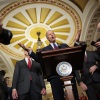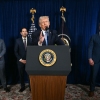Paul B. Miller shops at The Market food pantry in Logan, Ohio on Dec. 9. Food aid was just one of many services offered here that faced disruption in 2025.
Rich-Joseph Facun for NPR
hide caption
toggle caption
Rich-Joseph Facun for NPR
LOGAN, Ohio – Before dawn, in a cold, blustery drizzle, a line forms outside a small, squat building on an open stretch of road on the outskirts of town.
“My heater quit working in my car,” Scott Skinner says good-naturedly to the next man in line. “Man, what kinda luck am I having.”
The building is called “The Market” because it has a food pantry, but Skinner and the others are here to sign up for heating assistance. He’s been calling for a month to get an appointment with no luck, so he showed up an hour ago to snag a walk-in slot.
The demand for help is more acute than usual because heating aid was suspended during the recent government shutdown. At the same time, SNAP food benefits were suspended for weeks, and some food pantry shoppers are still playing catch up.
One of those people is Lisa Murphy. She’s 61, disabled and relies on Social Security, and says it’s important to have “places like this that really help us.”
“I still owe my gas bill. I owe $298,” Murphy says. “It’s hard to buy food and pay my bills, too.”
Lisa Murphy grocery shops at The Market food pantry in Logan, Ohio. She’s still behind on bills after SNAP food benefits were paused for two weeks during the recent federal shutdown.
Rich-Joseph Facun for NPR
hide caption
toggle caption
Rich-Joseph Facun for NPR
A detail from Miller’s grocery cart; signs tell clients the number of items that can be taken.
Rich-Joseph Facun for NPR
hide caption
toggle caption
Rich-Joseph Facun for NPR
But even as need grows with rising costs and unemployment, local anti-poverty groups like the one that runs The Market say their work has been threatened as never before amid the Trump administration’s funding cuts, pauses and reversals targeting a long list of safety-net programs. The shutdown was only the latest disruption that forced them to scramble to keep operating.
And, they say, the year of chaos has left deep uncertainty over which programs may be hit next.
‘Emergency response mode’
The Market in Logan, Ohio, is part of Hocking Athens Perry Community Action – HAPCAP for short – one of a thousand such agencies across the country that have been around since the 1960s. They connect some 15 million people with housing, health care, food aid and much more.
At HAPCAP, services include Meals on Wheels, Head Start, a public bus system, employment help, and a food bank that serves 10 counties across southeast Appalachian Ohio.
It’s an impressive range, but this year that’s also made it a big target for federal funding cuts.
“Eighty percent of our funding comes from federal grants,” says executive director Kelly Hatas. The “worst day” of her career was back in January, when the Trump administration ordered a federal funding freeze, saying it wanted to shift priorities and promote efficiency.
“When we got that news we were in immediate emergency response mode, like, what are we going to do?” she says.
Kelly Hatas, executive director of Hocking Athens Perry Community Action (HAPCAP), talks with the child of a couple who are shopping at the food pantry. Hatas says the nonprofit has had to scramble all year as various safety-net programs were hit with federal funding cuts or pauses.
Rich-Joseph Facun for NPR/www.facun.com
hide caption
toggle caption
Rich-Joseph Facun for NPR/www.facun.com
The most urgent threat was to six Head Start centers.
“Our Head Start director was on a call with all of her center coordinators telling them we’re laying everyone off tomorrow,” Hatas recalls. “And then there was some secondary information that was like, ‘Just kidding … Head Start is excluded.’”
That whiplash shook people’s trust. And the hits kept coming.
In March, the administration canceled or paused a billion dollars that helped food banks. In May, President Trump’s budget called for zeroing out Head Start and heating assistance, along with major cuts to other safety-net programs like rental aid. He also proposed eliminating the $770 million dollar Community Services Block Grant that directly supports these anti-poverty groups, including it in a list of “woke programs.”
Congress eventually funded many of those programs, but the Office of Management and Budget took months to get out the block grant money.
“OMB just decided not to spend it, totally usurping congressional authority,” says David Bradley, who advocates for these local groups with the National Community Action Foundation.
He says they’ve long had strong bipartisan support.
“So we’ve had two major fights with the administration,” he says. “We won them because Republicans helped.”
East Main Street in Logan, a small town in southeast Appalachian Ohio.
Rich-Joseph Facun for NPR
hide caption
toggle caption
Rich-Joseph Facun for NPR
In a statement, an OMB spokesperson said these anti-poverty programs fund “radically partisan activities, like teaching toddlers to be antiracist and ‘LGBTQIA+ welcoming.’” It also criticized a program that combined affordable housing with clean energy “in the pursuit of both economic and environmental justice.”
“President Trump ran on fiscal responsibility and ending wasteful DEI spending in government,” the statement says.“The American taxpayer should not be made to fund critical race theory.”
Health and Human Services spokesman Andrew Nixon said the agency “administers CSBG consistent with the funding levels Congress provides to support services for low-income families.”
Funding chaos and uncertainty
In Ohio, Hatas says the state has shifted money to help address federal funding crises as they’ve popped up to keep programs going. But the biggest challenge remains uncertainty.
“The panic and the just day-to-day not knowing what’s going to happen, is just really difficult,” she says.
Because of that, HAPCAP has scaled back some plans, including for a new Head Start facility and a much-needed homeless shelter. It’s also had to pull out of food distribution at schools because of a lack of staff. Some employees are leaving, worried about losing their jobs. Others have been laid off or had their hours trimmed.
“It cut my paychecks completely in half,” says Kelsey Sexton, who manages the front desk but was shifted to part-time in the fall. “We have a mortgage, a car payment. With Christmas coming, my husband was like, what are we going to do?”
She was bumped back up to full-time – but so far only temporarily – after the shutdown pause in SNAP payments brought a surge of people to the food pantry.
Losing a job can be extra tough in rural communities.
“We don’t really have jobs growing on trees … and so there’s nowhere for these folks to go,” says Megan Riddlebarger, who heads the Corporation for Ohio Appalachian Development (COAD) half an hour away in Athens.
Kelsey Sexton (left) had her hours as a desk clerk at HAPCAP cut in half. Megan Riddlebarger (right) heads the Corporation for Ohio Appalachian Development and says anti-poverty agencies are important for local economies in this rural region.
Rich-Joseph Facun for NPR
hide caption
toggle caption
Rich-Joseph Facun for NPR
She oversees federal funding for 17 antipoverty groups across the eastern part of the state, and says they’re important for rural economies.
“These aren’t just, like, people volunteering for fun,” she says. “These are some of the biggest businesses in town, buying most of the products that are bought and sold in the town.”
Helping people stay warm and at home
Down a flight of stairs from Riddlebarger’s office, five burly men at long desks take notes as Dave Freeman goes over how to properly install a water heater vent. It’s a refresher training class for inspectors, part of a weatherization assistance program the White House also wanted to end.
Freeman says many older homes in the area are full of cracks and crevices with almost no insulation.
“That house that you walk in (that) has the blanket at the stairway, so ‘Oh, honey, I haven’t been upstairs, it’s so cold up there,’” he says.
Weatherizing homes not only lets people live comfortably, it also saves them money.
“Say their electric bill goes down or gas bill goes down, they might be able to buy a pizza on a Saturday night,” Freeman says. “And that’s a big thing.”
Adam Murdock (left) attends attends a training class for weatherization inspectors at the Corporation for Ohio Appalachian Development.
Rich-Joseph Facun for NPR
hide caption
toggle caption
Rich-Joseph Facun for NPR
But COAD’s funding for weatherization was delayed months, which jeopardized staffing. “You can get paid to do similar work in the private sector, and so retaining that staff is already a challenge,” says Riddlebarger.
Most of the agencies she oversees were able to cover the gap until money finally came through in November. But she says it means squeezing what’s supposed to be a year-long program into about half that time “with the same expectations for performance reporting.”
Diana Eads’ volunteer job with COAD – which includes a small stipend – was also at risk earlier this year, when the Trump administration gutted AmeriCorps grants with little explanation. As part of the AmeriCorps Seniors companion program Eads visits and helps out low-income people.
“My companions have been elderly, they’re not able to get out,” she says. “They’re just one-step away from nursing home care.”
Diana Eads, 74, visits with elderly people as part of the AmeriCorps seniors program. When a funding cut threatened her small stipend for gas money, she told an 88-year-old woman who lives far away that she would keep visiting no matter what.
Rich-Joseph Facun for NPR
hide caption
toggle caption
Rich-Joseph Facun for NPR
If they were to land in a nursing home or assisted living, that could cost thousands of dollars a month in Medicaid spending. But Eads helps keep them at home for just $4 dollars an hour, to help cover gas or other small bills.
“Being rural, my one companion, it’s 56 miles roundtrip,” she says.
Riddlebarger managed to secure local philanthropic funding to keep operating, and after a legal challenge AmeriCorps federal funding was restored.
Through it all Eads reassured her companion, an 88-year old woman she’d been visiting for five years.
“I told her no matter what happened, I would not stop visiting,” Eads says. “That was important.”
A grim 2026 outlook
After a year struggling to keep serving those most in need, advocates say they don’t see much relief in site. Republicans in Congress passed major cuts to Medicaid and SNAP food aid and those will start to take hold.
The Trump administration also is considering dramatic limits to rental assistance and has laid out major cuts to long-term housing for people leaving homelessness, a move that faces a legal challenge.
On top of that, the administration’s mass firings and buyouts hit hard in offices that administer various safety-net programs.
The Market runs a food pantry and helps connect people with other services. In December, people seeking an appointment for heating assistance often line up outside before dawn.
Rich-Joseph Facun for NPR
hide caption
toggle caption
Rich-Joseph Facun for NPR
Riddlebarger says most anti-poverty funding already falls far short of the need, and making it even harder to help people is exhausting.
“Not knowing which of our many services we are going to be able to keep operating makes us waste valuable capacity trying to plug holes that shouldn’t be holes,” she says. “We’re just breaking the wheel and reinventing it at a great cost to all parties.”









































